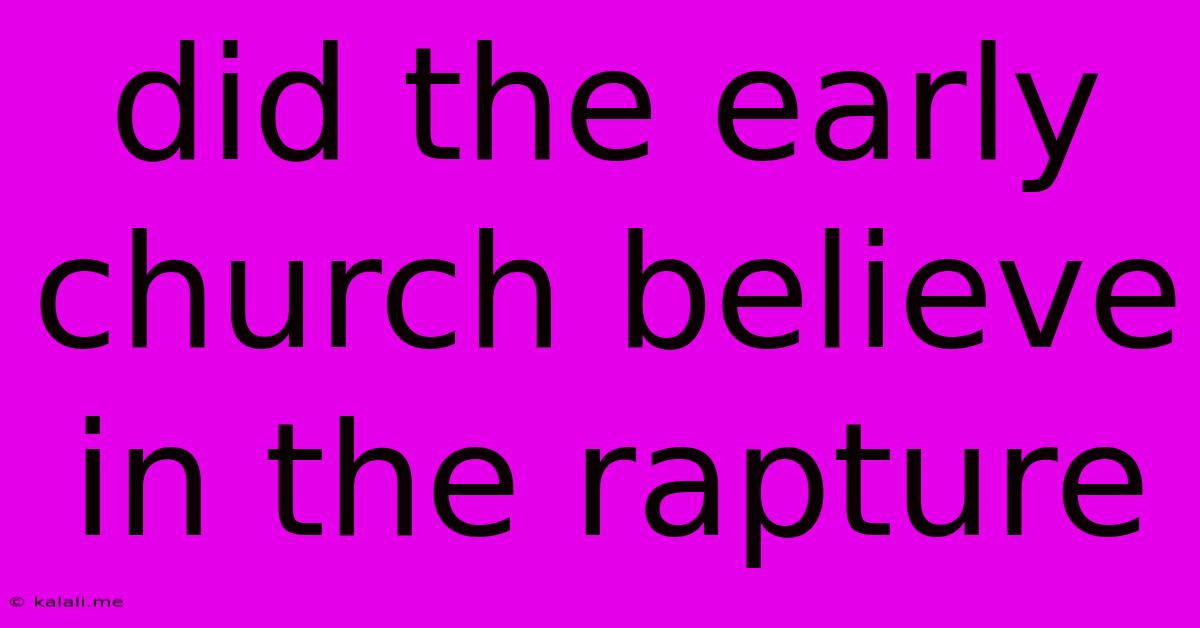Did The Early Church Believe In The Rapture
Kalali
Jun 07, 2025 · 3 min read

Table of Contents
Did the Early Church Believe in the Rapture? Unpacking the Eschatological Views of Early Christianity
The "Rapture," as understood in modern dispensational theology – a secret, pre-tribulation snatching away of believers before a period of tribulation – is a relatively recent interpretation of biblical prophecy. The question of whether the early Church believed in the rapture, as we define it today, is complex and requires careful examination of their diverse eschatological views. The short answer is: no, not in the modern dispensational understanding. However, their beliefs about the return of Christ and the end times were varied and nuanced.
The early Church Fathers, writing in the centuries following Christ's ascension, didn't possess a unified, codified understanding of end times events like the modern Rapture. Their perspectives were shaped by various interpretations of biblical texts, particularly the books of Daniel and Revelation, alongside their immediate socio-political contexts. While they anticipated Christ's return and a final judgment, the how and when differed significantly from the modern Rapture doctrine.
Interpretations of Biblical Prophecy in the Early Church
Early Christian writers didn't focus on a pre-tribulation rapture. Instead, their interpretations often centered on:
-
A Parousia involving both a resurrection and judgment: The emphasis was on Christ's return (Parousia) as a single, visible event, bringing about the resurrection of the dead and the final judgment. This event was often understood as imminent, but its precise timing remained unknown. The focus was less on a secret removal of believers and more on a public and dramatic return of Christ to judge the living and the dead.
-
Different understandings of the "day of the Lord": While the concept of a "day of the Lord" – a period of divine judgment – featured prominently, interpretations varied widely. Some emphasized a sudden, cataclysmic event, while others saw it as a longer period of tribulation and testing. The idea of a pre-tribulation removal to avoid this tribulation is absent from their writings.
-
Emphasis on spiritual realities over temporal specifics: The early Church often prioritized the spiritual realities of Christ's return – salvation, judgment, and the establishment of God's kingdom – over precise chronological details. Speculation about specific dates and events was generally discouraged.
Key Figures and Their Views
Examining the writings of key figures from the early Church further illuminates the absence of a pre-tribulation rapture belief:
-
Augustine: A highly influential figure, Augustine (354-430 AD) emphasized the importance of living a righteous life in anticipation of Christ's return but didn't describe a secret pre-tribulation removal. His understanding of the "thousand-year reign" (millennium) was different from later interpretations that heavily influence modern rapture theology.
-
Irenaeus: Irenaeus (c. 130-202 AD), in his writings against Gnosticism, focused on the importance of Christ's earthly ministry and his future return to establish a fully realized kingdom of God. This emphasis again doesn't align with the secret, pre-tribulation rapture concept.
-
Other Early Church Fathers: Similar perspectives can be found in the works of other early Church Fathers, like Tertullian, Origen, and Cyprian. Their eschatology, though varied, generally lacked the elements of a secret pre-tribulation rapture.
The Development of Rapture Theology
The modern concept of the rapture, as a distinct event preceding a period of tribulation, emerged much later, largely gaining traction in the 19th and 20th centuries through the writings of dispensationalist theologians. This interpretation, influenced by specific readings of biblical prophecy and a strong focus on literal interpretation, differs significantly from the eschatological views prevalent in the early Church.
In conclusion, while the early Church eagerly awaited Christ's return and the final judgment, their understanding of these events diverged sharply from the modern dispensational understanding of the rapture. The concept of a secret pre-tribulation removal of believers simply doesn't find its roots in the writings and theological perspectives of the early Church Fathers. Their focus was on the spiritual significance of Christ's return and living a life worthy of his coming, rather than speculating on the precise timing and mechanics of a pre-tribulation event.
Latest Posts
Latest Posts
-
Can I Do A Balance Transfer For Someone Else
Jun 07, 2025
-
Does A Deck Have To Be Attached To The House
Jun 07, 2025
-
Wiring 2 Light Switches To 1 Light
Jun 07, 2025
-
Is There Such A Thing As Quantifiable Truth
Jun 07, 2025
-
Can You Use We In A Research Paper
Jun 07, 2025
Related Post
Thank you for visiting our website which covers about Did The Early Church Believe In The Rapture . We hope the information provided has been useful to you. Feel free to contact us if you have any questions or need further assistance. See you next time and don't miss to bookmark.